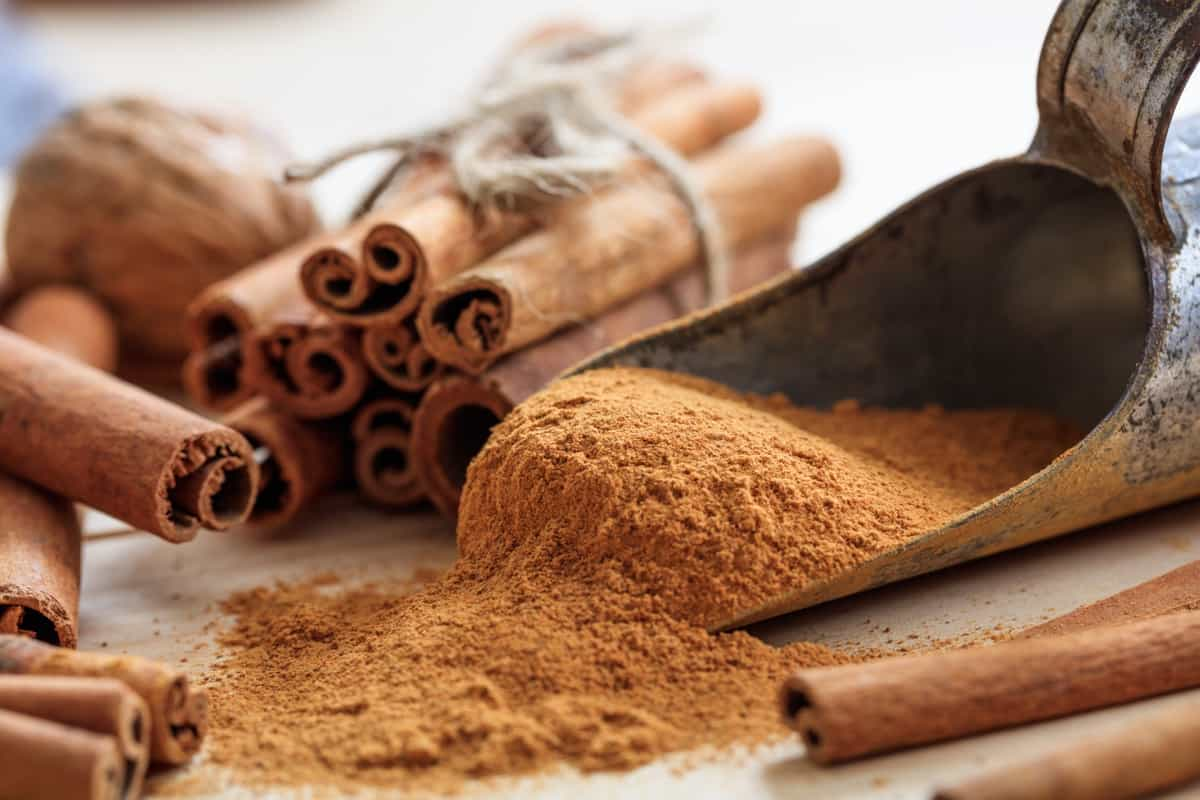Are you tired of battling persistent pests that wreak havoc on your garden plants? Look no further than your kitchen spice rack for a surprisingly effective remedy: cinnamon powder. This humble yet potent ingredient possesses remarkable properties that can safeguard your garden from unwanted invaders.

In this blog, we will explore the numerous benefits of cinnamon powder on plants and a simple DIY recipe that you can easily whip up at home. We will also explore how often you should use cinnamon on your plants to achieve optimal results. Get ready to unlock the secret to a thriving, pest-free garden!
Benefits of Cinnamon Powder on Plants
What is Cinnamon Powder?
Cinnamon powder is a spice derived from the bark of Cinnamomum trees. Making it involves powdering the dried bark. Known for its sweet and warm flavor, cinnamon powder is widely used in culinary dishes and beverages and as a natural remedy for various health benefits. Now it is also used to control pests and diseases in the garden.
What Are the Ingredients Needed to Make Cinnamon Powder?
You only need a few simple ingredients to make a cinnamon powder spray. The primary ingredient, of course, is cinnamon powder obtained from grinding cinnamon bark. Additionally, you’ll require water as a base to dilute the cinnamon. For added effectiveness, a small amount of liquid soap can be included to help the spray adhere to the plants and pests.
Recipe/Prepare Cinnamon Powder at Home
- Gather the ingredients: You’ll need cinnamon powder, water, a spray bottle, and a small pot.
- Measure the cinnamon powder: Place two tablespoons of cinnamon powder in the pot.
- Boil water: Pour 2 cups of water into the pot with the cinnamon powder.
- Heat the mixture: Place the vessel on the stove and bring the water to a boil. Let it simmer for about 30 minutes.
- Cool and strain: Remove the pot from the heat and allow the mixture to cool. Strain through a fine-mesh to remove any solid particles.
- Transfer to a spray bottle: Pour the cinnamon-infused water into a clean spray bottle.
- Use as needed: Your homemade cinnamon powder spray is now ready. Apply it directly to the leaves and soil of your plants to deter pests and combat fungal infections.
How Does Cinnamon Powder Work?
Cinnamon powder spray works in different ways to benefit plants. Firstly, antifungal properties help prevent and treat fungal infections in plants. Secondly, it is a natural deterrent for pests, repelling insects like ants, aphids, and gnats. Additionally, cinnamon powder spray can stimulate root growth and enhance plant vigor. It provides a protective barrier against diseases and promotes overall plant health, making it an effective natural remedy for plant care.
What Pests and Diseases Can Cinnamon Powder Control?
Cinnamon powder spray has the potential to control and combat a variety of pests and diseases in plants. It acts as a natural fungicide, inhibiting the growth of fungal infections such as damping-off, powdery mildew, and leaf spot diseases. Furthermore, it repels and deters pests like ants, aphids, gnats, and slugs.
The mechanism behind cinnamon’s effectiveness lies in its antimicrobial properties, disrupting the fungi and bacteria’s cell membranes and hindering their growth and spread. Additionally, the strong scent of cinnamon acts as a repellent, keeping pests away from plants and reducing the risk of infestation.
In case you missed it: 9 Causes of Dying Cinnamon Trees and How to Fix Them?

How to Store Cinnamon Powder?
- Cinnamon powder storage: Keep the cinnamon powder in a container that is airtight and placed in a dark, cool, and dry area, such as a pantry, store room, or cupboard.
- Cinnamon spray storage: Pour the prepared cinnamon spray into a clean, labeled spray bottle. Store it in a place away from direct sunlight.
- Check for freshness: Periodically check the cinnamon powder and spray for any signs of moisture, clumping, or fragrance loss. It’s time to replace or prepare a fresh batch if any of these occur.
How Often Should You Use Cinnamon Powder for Your Plants?
When it comes to using cinnamon powder for your plants, the application frequency depends on your garden’s specific needs and conditions. As a general guideline, often use cinnamon powder every 2-3 weeks or as needed. This could be when you notice signs of pests or fungal infections.
However, avoiding overusing cinnamon is important, as excessive amounts may disrupt the natural balance of your plant’s ecosystem. Regularly observing your plants and their environment will help you determine the appropriate timing for applying cinnamon powder and maximize its benefits.
Best Time to Apply and How Much Cinnamon Powder Should You Use for Your Garden Plants
Determining the best time to apply cinnamon powder to your garden plants and the appropriate dosage is essential for optimal results. When it comes to timing, it is recommended to apply cinnamon in the morning or evening when the weather is mild, and the plants are not exposed to direct sunlight.
As for dosage, a general guideline is to use 1 to 2 tablespoons of cinnamon powder per gallon of water. However, it’s important to consider the specific needs of your plants and adjust the dosage accordingly. Start with a smaller amount and observe the plant’s response before increasing the dosage if needed.
How Long Does It Take for Cinnamon Powder to Work for Your Plants?
It may take 5-7 days or weeks to see noticeable results. Cinnamon acts as a repellent for pest control, deterring insects from infesting your plants. For fungal infections, cinnamon can help inhibit the growth of fungi and prevent further spread.
Benefits for Plants Using Cinnamon Powder in the Home Garden
Cinnamon has gained recognition as a beneficial ingredient for plant care due to its numerous advantages. When using cinnamon on plants, it is important that it can be applied directly to the soil around the plant base or as a foliar spray. The benefits of cinnamon powder for plants are extensive.
Firstly, cinnamon acts as a natural fungicide, helping to combat and prevent fungal infections that can harm plant health. Secondly, it possesses antimicrobial properties that inhibit the growth of harmful bacteria in the soil. Additionally, cinnamon is a deterrent to pests by repelling insects such as ants, aphids, and gnats.
Moreover, it stimulates root growth, enhances plant vigor, and improves overall plant health. As for frequency, it is recommended to apply cinnamon every few weeks or when signs of pests or fungal infections are observed. Incorporating cinnamon into your plant care routine can yield significant benefits, making it a valuable addition to any garden or indoor plant collection.
In case you missed it: Frequently Asked Questions About Cinnamon Farming

Safety Precautions When Using Cinnamon Powder
- Use organic cinnamon powder to avoid any potential chemical contaminants.
- Avoid excessive application, as it may cause plant stress or damage.
- Conduct a patch test on a small plant section to check for adverse reactions.
- Keep cinnamon powder away from children and pets, as ingestion can be harmful.
- Store cinnamon powder in a cool, dry place to maintain its potency.
- Wash hands thoroughly after handling cinnamon powder to prevent any potential skin irritation.
Conclusion
Incorporating cinnamon powder into your plant care routine offers a range of benefits. It acts as a natural fungicide, repels pests, stimulates root growth, and enhances overall plant health. With a simple DIY recipe, you can harness the power of cinnamon to create a thriving, pest-free garden.
- Feed Your Flock for Less: Top 10 Tips to Save on Chicken Feed
- Ultimate Guide to Ossabaw Island Hog: Breeding, Raising, Diet, and Care
- Hatching Answers: The Top 10 Reasons Your Chickens Aren’t Laying Eggs
- Eggs and Economics: Breaking Down the Cost of Raising Backyard Chickens
- Defend Your Greens: Proven Methods to Keep Iguanas Out of Your Garden
- Ultimate Guide to Cinnamon Queen Chicken: A Comprehensive Guide for Beginners
- Ultimate Guide to California Tan Chicken: Breeding, Raising, Diet, Egg-Production and Care
- Ultimate Guide to Marsh Daisy Chicken: Breeding, Raising, Diet, and Care
- 10 Types of Chicken Farming Businesses You Can Start for Profits